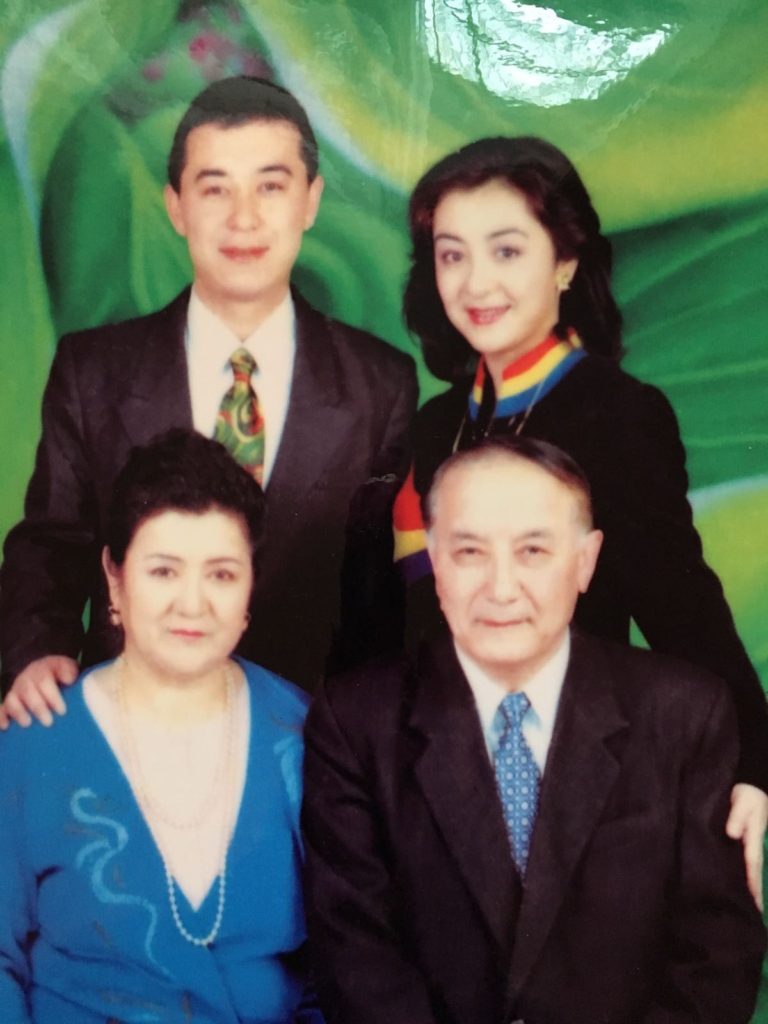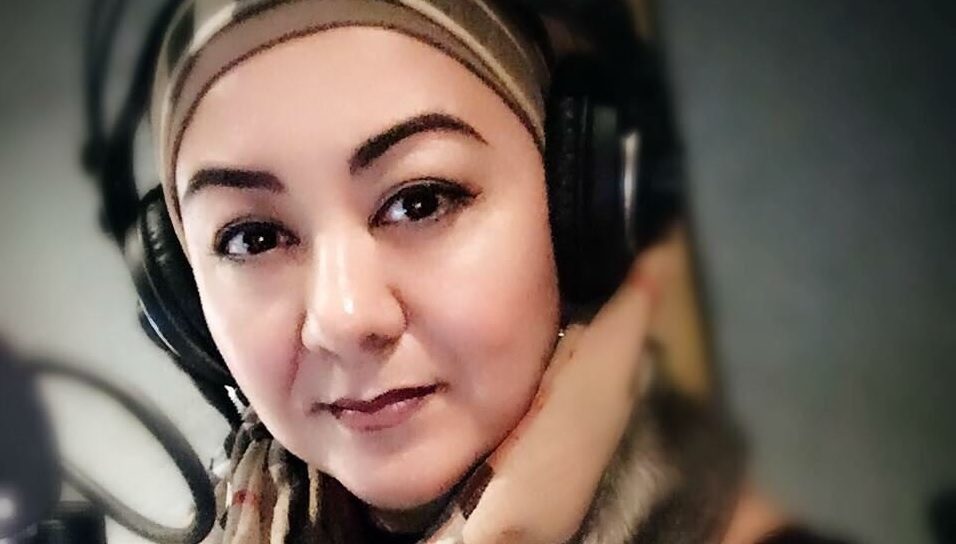Gulchehra Hoja still remembers the first time her daughter, then three years old, met her grandparents. “That was their happiest time,” Gulchehra said of her parents. “They treated her like a princess.”
That was 10 years ago. It was her daughter’s first time to visit the Xinjiang Uighur Autonomous Region (XUAR) of China, where Gulchehra grew up. Her husband had travelled with their eldest daughter from Washington DC, Gulchehra’s home for nearly 20 years due to her work as a journalist with Radio Free Asia’s Uighur Service.
Gulchehra had no choice but to miss that family holiday. Her journalism means it is too dangerous for her to visit the XUAR, but she speaks with her parents each week on the phone. At least she did until early February, when she lost contact.
Family detained
She learned from family friends that her parents had been caught up in a sweep of arrests targeting some 20 members of her family. Now Gulchehra’s mother, Qimangul Zikri, has been released, but her father remains under guard at a hospital, and many of her other family members are still missing.
Even if they are all set free, that fear still lives with me…When will the nightmare start again?
Journalist Gulchehra Hoja on her family's plight.
On 10 March, Gulchehra was finally able to speak with her mother by phone for the first time in over a month. Gulchehra’s three children crowded around her as their grandmother recounted her story by phone: On the evening of 1 February, police arrested Qimangul and questioned her aggressively about Gulchehra. They put a hood over her head and placed her in handcuffs that remained on her wrists for the nine days she spent in a crowded cell.
She and the other inmates shared one toilet and had no access to water for washing. Qimangul is in her seventies and suffers from heart disease. She recently had foot surgery. She felt her blood pressure surging and asked for her heart medicine. The guards gave her some cough drops instead, but Qimangul a pharmacist, wasn’t fooled.
For nine days, she ate cold, unappetizing food. “I ate for you,” Qimangul told her daughter. “I wanted to live.” Her heart disease worsened during her time in jail before police finally delivered her to a hospital. A neighbourhood policeman, who sees Qimangul regularly, didn’t even recognize her when she finally came home.
Brave
“She is brave,” Gulchehra said of her mother. Qimangul’s first concern when Gulchehra was able to reach her was whether her daughter had worried too much. Gulchehra’s father, who is half-paralyzed following a stroke, and was in a hospital already at the time of the arrests, remains there under guard.
The Chinese government has been harassing Gulchehra’s family for years because of her journalism for Radio Free Asia. She is one of six Washington-based employees of the broadcaster’s Uighur service whose families have been targeted by the Chinese government.
In late September, police also arrested Gulchehra’s brother, Kaisar Keyum, and told their mother it was because of Gulchehra’s reporting. Qimangul had been hoping for news on her son when she too was arrested.
The detentions come amid a wider crackdown in the XUAR. What the Chinese government describes as a campaign against extremism and separatism has expanded to mass detentions of tens of thousands of peaceful Uighurs and other predominantly Muslim ethnicities. They are sent to various detention facilities which have been set up within the XUAR, which the authorities label as “counter extremism centres”, “political study centres”, or “education and transformation centres”.
The government also restricts the Uighur culture, language, and religion. Radio Free Asia is one of only a few media outlets to report on the issue in depth and the only major outlet to do so in the Uighur language.
For Gulchehra, now a US citizen, the idea of erasing Uighur culture is unthinkable. She and her brother grew up minutes away from Xinjiang Regional Museum, where she visited often with her father, an archaeology professor. Her grandfather was a musician who introduced her to traditional Uighur music when she was a girl.
After graduating from university, Gulchehra worked for Xinjiang TV, where she created the first children’s TV programme on the history of the XUAR. For her first television appearance she wore a floral hat and her hair in two ponytails, an iconic Uighur image. Gulchehra’s father encouraged her to think of the programme as more than entertainment. “Teach them to think,” he told Gulchehra. “Teach them to be proud of being Uighur.”

When she was 27 years old, Gulchehra traveled to Europe for vacation. There, she listened to a radio bulletin about a protest by Uighur people in Germany against the Chinese government. She said it was the first time she’d ever heard such powerful and brave voices. At the same time, she was facing increased pressure by the Chinese authorities at home to tow the party line on her children’s show.
“I asked myself what I was doing,” she said. “Am I loving my people, using my voice? My heart was pounding.”
Give up everything
After three more agonizing days in Europe, Gulchehra called the director of Uighur services at Radio Free Asia. She told him she was ready to work for them. The director knew of her already because of her television show. He asked if she was ready to give up everything. She might not be able to return home. She would face harassment. She said yes.
Gulchehra didn’t tell her parents about her decision, because she feared they would talk her out of it. She waited until she was safely in the USA before calling. Her father answered the phone. She told him she was in America, working for Radio Free Asia. After about 10 seconds of shocked silence, he said, “Oh, my brave girl.”
Her mother also worried, but said that if Gulchehra felt her decision was right, and if she was happy, it was enough for them. Following Gulchehra’s move to the USA, Chinese authorities threatened her parents and took their passports. Gulchehra lost contact with nearly all her old friends. She understands why they stopped talking to her, but that didn’t make it any easier.
That was 17 years ago. Gulchehra has worked for Radio Free Asia’s Uighur service ever since. And police haven’t stopped harassing her family.
Gulchehra thinks a lot about her family and her decision to come to America. And she knows she has to continue reporting and speaking out, because if she and her colleagues stop, no one would be able to fill the gap.
She thinks of her cousins, who worked hard to establish a successful business in Xinjiang and are now held in detention. She thinks of an aunt who is caring for her three grandchildren, ages 2, 8, and 10, while her two sons and daughters-in-law are detained too.
Separated souls
Gulchehra remembers something her father said, when her eldest daughter was born. He told her he was so happy, but now he felt his soul was separated. Gulchehra said that she too feels her soul is separated now between Washington and the XUAR.
She thinks about bringing her parents to the USA but her mother thinks that would be impossible. “Even a fly cannot get out of Xinjiang now,” she told her daughter.
Gulchehra feels she has to continue working to get her family released and to speak out in the meantime. “If this is how they treat a woman in her seventies, what is happening to my brother?” she asked. “Even if they are all set free, that fear still lives with me,” she said. “When will the nightmare start again? What can I do? Who can I talk to? Who is going to care about us?”


